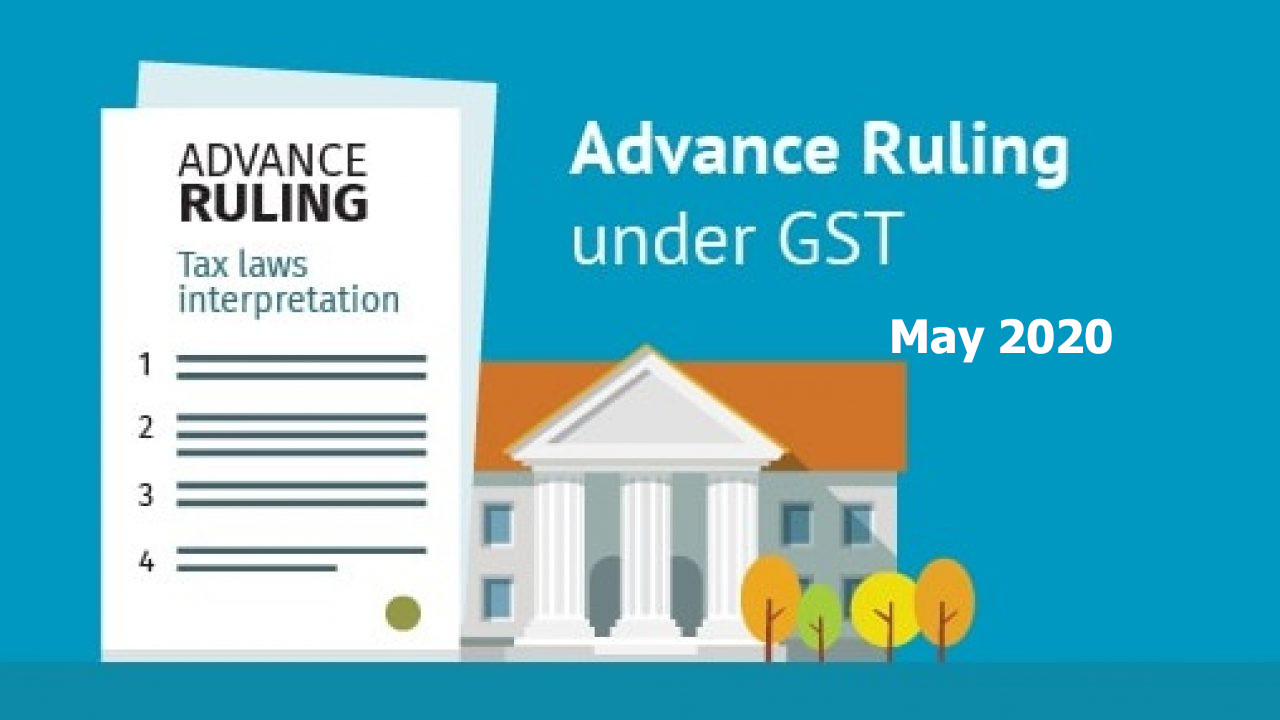1. Whether second hand gold jewellery purchased from unregistered person can be valued as per marginal scheme under GST?
Held: Yes
In the case of M/s Attica Gold Pvt Ltd.-AAR Karnataka, the applicant is in the business of sale of used (second hand) goods. He purchased used gold jewellery from unregistered persons and sells them to others. The applicant sought an advance ruling whether it can avail the benefit of marginal scheme under GST, while selling those second hand jewelleries?
The applicant contended that as per Rule-32(5), if a person is engaged in the supply of second hand goods, then he can avail the benefit of marginal scheme as per Notification No.10/2017- C.T (R) dated 28.06.2017 provided he satisfies all the prescribed conditions. Further explaining the scope of the Rule, the applicant stated that the said rule covers a situation where a person is dealing in buying and selling of used goods. In such case, the value of supply shall be the difference between the selling price less purchase price. To opt for the prescribed mode of valuation, the following conditions need to be fulfilled-
i) used goods as such or after such minor processing which does not change the nature of the goods, and
ii) no input tax credit has been availed on the purchase of such goods
the value of supply shall be the difference between the selling price and the purchase price and where the value of such supply is negative, it shall be ignored.
The applicant also stated that it is settled jurisprudence principle that the words of a statute is clear, plain and unambiguous, then the courts are bound to give effect to that meaning irrespective of consequences. The above principle is also followed in the case of Nelson Motis v. UOI and Govt. of Andhra Pradesh v. Road Rollers Owners Welfare Association.
The Authority referred Rule-32(5) and stated that if the applicant purchases the second hand goods from other registered persons, then he would be ineligible to apply marginal scheme for supplies of such second hand goods. Hence, in the present case, the applicant is entitled to avail the benefit of marginal scheme provided under Rule-32(5) of the CGST Rules, 2017.
2. Whether Seva services and sale of prasadam by temples are exempt under GST?
Held: Yes
In case of M/s Shri Malai Mahadeshwara Swamy Kshetra Development Authority-AAR Karnataka,the applicant is registered as a religious and charitable institution under Section 12-AA of the Income Tax Act. It has been rendering various Seva services and supplies Prasada items to the pilgrims in Sri Mahadeshwara Swamy Temple at Male Mahadeshwara Hills. It also rents out accommodations and other commercial places, either by itself or sells off the rights to provide such services, and in lieu of this collects the money consideration. With regard to seva services, it performs several seva services in the form of Pooja in the precincts of temple and charges the prescribed rates for services offered to devotees. The applicant sought an advance ruling on the taxability of seva services and sale of prasadam by it.
The Authority referred to section-7 of the CGST Act, 2017 and stated that the seva services are not in the course or furtherance of business and hence the same cannot be covered under the scope of supply, though there is no money received by the applicant for the same. Further, even the definition of consideration also states that the money received should be in relation to the supply of goods or services or both. Hence, the seva services provided by the applicant are exempt under GST. Regarding the question of taxability of sale of prasadam, entry no.98 of the Notification No. 2/2017- C.T (R) dated 28.06.2017 exempts the goods falling under “Prasadam supplied by the religious places like temples, mosques, churches, gurudwaras, dargahs, etc”. It is very clear from the notification that the items of prasadam sold by the applicant are exempt from GST. However, if the applicant sells items other then prasadam, like clothes, bags, etc. then such goods are liable to tax under GST as they do not form part of the prasadam.
3. Whether sale of religious books is taxable under GST?
Held: No, it is exempt from GST
In case of M/s Ideal Industrial Synergy Solutions Limited -AAR Karnataka, the applicant is in the business of printing and selling of religious books for various Islamic educational institutions across India. It sought an advance ruling on the taxability of the sale of religious books.
The applicant stated that the content is provided by the religious heads and they are printing and selling the same to Madarasas. The books are not sold to the content providers, rather they are sold to the religious schools as per the orders received from such schools. The billing is also done to the Madarsas and the books are also supplied to the Madarsas.
The Authority found that the supply is made by the applicant to Madarsas for a consideration and the contract is for supply of religious books for consideration. This being in the course of business would amount to supply of books as per section-7(1) of the CGST Act, 2017. There is no direct link between the recipient of books and the supplier of the content and the final product is supplied to the recipient of books and the content provider has no role in selection of the recipient for sale. The said supply is covered under the Exemption Notification No.02/2017- C.T (R) (entry no. 119). Hence, the sale of religious books is exempt under GST.
4. Whether sale of pre-designed software which is made available through the use of encryption keys be treated as ‘Computer Software’ resulting in supply of goods under GST?
Held: Yes
In case of M/s Solize India Technologies Pvt Ltd. -AAR Karnataka, the applicant is engaged in purchase of software from their principal partner and supply the same to their customers. The applicant sought an advance ruling on whether software supplied by it can be treated as computer software resulting in supply of goods?
The applicant submitted that the software supplied could be used by the customers in different fields depending on their requirement. It is a package software and not tailor made to suit individual requirement. It stated that their customer base is mainly Govt. departments, PSU’s etc. the Notification No. 45/2017- C.T (R) dated 14.11.2017 provides a concessional rate of 5% GST on goods listed in it. In the said notification, “Computer Software” was termed as Goods, for the purpose of applicability of concessional rate of GST. ‘Computer Software’ is not defined in the GST Law. Hence, the applicant viewed ‘Computer Software’ as ‘Goods’ and the concessional rate is applicable on it.
The Authority stated that the applicant purchases the off-the-shelf software which are not developed for any specific client. Hence, the software sold by the applicant is pre-developed or pre-designed software and made available through the use of encryption keys and hence it satisfies all the conditions that are required to be satisfied to treat it as ‘goods.’ Also, the software can be used only with the aid of the computer and has to be loaded on a computer and then after, activation is possible. Hence, the supply of software is covered under ‘supply of goods’ and is eligible for the concessional rate of 5% GST.
5. Whether TDS is to be deducted from the amount received for catering services to educational institutions?
Held: No
In the case of M/s. Mahalakshmi Mahila Sangha-AAR Karnataka, the applicant, an association of persons registered under GST, is providing catering services to educational institutions. It has sought an advance ruling on whether the catering services provided by it is exempt in terms of Notification No.12/2017- C.T (R) dated 28.06.2017 and if it is exempt, then whether the provisions of TDS under GST is applicable to it?
The applicant stated that they are providing catering services to the educational institutions sponsored by the State/Central/ Union Territory. Hence, the same should be exempt under GST. Further, as they are engaged in providing exempt services, the provisions of TDS under GST i.e. section-51 of the CGST Act, 2017 will not be applicable for them.
The Authority stated that the applicant has to prepare food in the respective schools only and there is no provision of food cooked outside the premises of schools. Further, the student belongs to primary school category. Hence, the service is a catering service provided to an educational institution which is a primary school and hence is covered under the Entry no.66 of Notification No.12/2017- C.T (R) dated 28.06.2017 as amended from time to time and is exempted from GST. Answering to the second limb of the question i.e. applicability of section-51, the Authority stated that the provision of TDS under GST is applicable on the payment made to a supplier of taxable services and since the applicant is supplying exempt services, the said provisions are not applicable to the payments made to them by the educational institutions.
6. Whether separate registration is required in a state where a person is executing a contract and has no permanent establishment and the principal place of business is registered in another state?
Held: No
In the case of M/s T & D Electricals-AAR Karnataka, the applicant is a works contractor and has been awarded a contract for electrical instrumentation and I.T jobs/Installations at Karnataka. The applicant does not have any premises in Karnataka and the contractee will only provide temporary small space for office. The applicant sought an advance ruling on the matter that whether it is required to obtain registration in the state of Karnataka?
The applicant submitted that as per section-22(1) of the CGST Act, 2017, a supplier is liable to be registered in a state from which it makes a taxable supply of goods or services or both. Further, sec-2(71)(b) of the CGST Act, 2017 provide that where a supply has been made from a place other than place of business for which registration has been sought, then the ‘location of supplier of service’ shall be the location of fixed establishment. Also, as per section-12(3)(a) of the IGST Act, 2017, the place of supply of works contract services will be the location at which the immovable property is located. Hence, the applicant contends that it is not required to obtain registration in Karnataka.
The Authority referred section-22 of the CGST Act, 2017, and observed that the applicant intends to supply goods or services or both from the principal place of business, which is located in Rajasthan. It does not have any other fixed establishment other than the principal place of business. Therefore, the location of the supplier is nothing but the principal place of business, which is in Rajasthan. Thus, there is no requirement for a separate registration in Karnataka for the execution of the contract.
7. Whether supply of purified water to public in empty unsealed cans is exempt under GST law?
Held: No
In case of M/s. Water Health India Pvt. Ltd.–AAR Karnataka, the applicant is engaged in the business of supplying purified water in different types such as in unsealed form by filling customer empty cans, in 20 ltr unsealed cans and through piped network to establishments. It had entered into an agreement with local panchayats for the supply of purified water to the general public. The applicant supplied pure water to the public at a reasonable price. The applicant sought an advance ruling on whether the above service is exempt or not under GST?
The applicant submitted that as per Notification No.02/2017-C.T (R) dated 28.06.2017, the supply of water is exempted under GST. The notification exempts all types of water other than those sold in sealed containers. It also referred circular no.52/26/2018 dated 09.08.2018. Therefore, the applicant contended that supply of purified water, unless sold in sealed containers, should be eligible for exemption.
The Authority stated that the contention of the applicant with reference to the notification is that the term ‘water sold in sealed containers’ runs along with the remaining terms of the notification. The Authority observed that in ordinary usage ‘and’ is conjunctive. There is no hard and fast rule as to the meaning of the word ‘and’ and this word gets its proper meaning from the particular context from which it has been used. It relied on the interpretation of ‘and’ done by the Hon’ble Allahabad High Court in the case of Sukhnandan V. Suraj Bali and stated that the word ‘and’ used before the ‘water sold in sealed container’ in the notification stated above is in disjunctive nature and lays down that ‘water sold in a sealed container’ is the another type of water excluded from the said entry along with other category of water. Thus, supply of purified water to the general public in an unsealed container is not entitled for exemption from GST.
8. Whether leasing of trucks without operator to GTA is exempt under GST?
Held: Yes.
In the case of M/s. lshan Resins & Paints Limited-AAR West Bengal, the applicant in tends to lease vehicle entailing the transfer of the right to use. The lessee will enjoy possession of the vehicle and provide the operator, bear the cost of fuel, maintenance, insurance, etc. The applicant sought an advance ruling on the taxability of the transaction referred above.
The applicant stated that sl no. 22 of the Exemption Notification exempts the service by way of giving on hire a means of transportation of goods to a goods transport agency. However, leasing out a vehicle without operator where the control and possession is transferred to the lessee is different from giving the vehicle on hire. lt referred the judgment of Hon’ble Uttarakhand High Court in Commissioner of Customs & Central Excise Vs. Sachin Malhotra 12015 (37) STR 684 (Uttarakhand). The applicant contended that its service of leasing the vehicles without operator can be taxed under the appropriate heading under Sl No. 17 of the Rate Notification.
The Authority stated that ‘Hiring’ includes agreements where the control and possession of the goods are transferred to the hirer. It is known as the transfer of the right to use the goods. Sl No. 22 of the Exemption Notification should, therefore, apply to all hiring of the means of transportation of goods, provided the hirer is a goods transport agency and no other specific provision is made for taxing the transfer of the right to use such goods. Therefore, the applicant’s service is exempt under GST.



